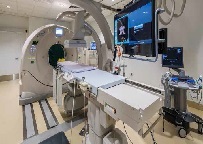por
Lauren Dubinsky, Senior Reporter | September 23, 2016

Toshiba America Medical Systems Inc.’s
Infinix 4D CT at the CARTI Cancer Center
From the September 2016 issue of HealthCare Business News magazine
It used to take Dr. David Hays of CARTI Cancer Center in Little Rock, Arkansas, an hour to perform an interventional radiology procedure, but that’s been cut down to 12 minutes, thanks to the center’s new 4D CT system. In late May, CARTI became the first facility in the U.S. to acquire Toshiba America Medical Systems Inc.’s Infinix 4D CT. The system merges the Infinix-i angiography system and the Aquilion ONE ViSION Edition CT scanner.
Hays can now use CT to visualize hepatoma embolization procedures and confirm that the treatment is hitting the right areas. He can also guide catheters into the vessels with the angiography system’s 3-D road map. “There is a path and all I have to do is push my needle down that line and I go right to it,” said Hays. “It takes what I used to be really good at doing and makes it so almost anyone can do it.”
One of his patients had a metastatic lesion in her liver in a location that was very difficult to access. Previously, he would have passed the needle through the lung and diaphragm to reach the liver, which could lead to complications. With the Infinix 4D CT, he was able to bypass the lung and diaphragm and place the needle directly through the liver.



Ad Statistics
Times Displayed: 2204
Times Visited: 10 Fast-moving cardiac structures have a big impact on imaging. Fujifilm’s SCENARIA View premium performance CT brings solutions to address motion in Coronary CTA while delivering unique dose saving and workflow increasing benefits.
Dual-source CT
Another popular technology is dual-source CT, according to MD Buyline. Siemens Healthineers’ SOMATOM Force is currently the only system on the market. It has two X-ray tubes and two detectors, which makes it much faster than conventional systems. There has been particular interest in using it for cardiac and pediatric imaging. “From a cardiac standpoint, it’s all about trying to stop cardiac motion and having the fastest temporal resolution possible,” says Christine Ziemba-Landon, CT product marketing manager at Siemens.
When you have one X-ray source spinning, you can only spin it so fast and it results in slow temporal resolution. The SOMATOM Force has two Vectron X-ray tubes spinning simultaneously, which cuts the temporal resolution to 66 milliseconds — the industry’s gold standard. Many patients entering the emergency department can’t hold their breath or don’t understand the breathing instructions. With the Force, it only takes one second to scan the chest, abdomen and pelvis, and that significantly reduces breath-hold times for patients.
Before a CT exam, some children have to be sedated because they are frightened by large pieces of equipment. But it’s a controversial practice. New research shows that sedation can cause long-term negative effects in children, says Ziemba-Landon. The Force can scan a child in less than a second, which eliminates the need for sedation. The system also has new X-ray tube technology. It has plenty of mA available as the Vectron tube allows clinicians to use low kV imaging, even on adult patients.

